

Grammar and Vocabulary Worksheets for English. Gerund and Infinitive Worksheets. English Grammar from ZbEnglish.net Downloadable grammar sheets and online exercises Gerund and Infinitive - Worksheets Gerund and infinitive worksheets are in PDF Format and consist of a worksheet and answer sheet to check your results.
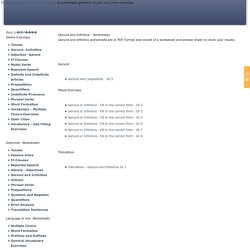
Error Analysis- PDF Worksheets - English Vocabulary and Grammar. Editing - One Word Too Many - Online Exercises - English Grammar. Key Word Transformation - Online Exercises - English Grammar and Vocabulary. Prefixes and Suffixes - Online Exercises - English Grammar and Vocabulary. Word Formation - Online Exercises - English Grammar and Vocabulary. Missing Word Cloze - Online Exercises - English Grammar and Vocabulary. Open Cloze - Online Exercises - English Grammar and Vocabulary. Gerund - Infinitive - Online Exercises - English Grammar. English Grammar Online Exercises and Downloadable Worksheets Gerund - Infinitive Online Exercises on the use of the gerund as well as the infinitive with and without "TO".
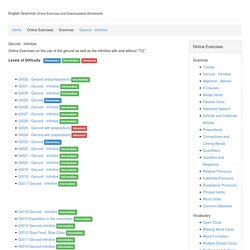
Gerund - Infinitive - Online Exercises - English Grammar. Grammar Exercises - Pre-Intermediate. Page Five. Page 5 Question Tags Exercise Question tags are hard, aren't they?
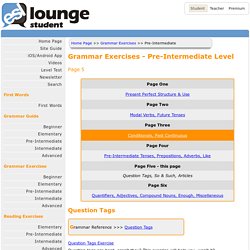
This exercise will help you, won't it? Exercise Number: 2G16 Question Tags Error Exercise Find the mistakes in this question tag exercise. Exercise Number: 2G52. Is slavery a thing of the past? Designed to raise awareness of the UN's World Day against Trafficking in Persons, this lesson begins by asking students to consider what they know about the issue, then takes them through a process of learning more before concluding by asking them about what they have learnt, and how their understanding might have changed. The lesson involves plenty of speaking, a vocabulary focus, which pre-teaches topic related vocabulary later found in the text, a jigsaw reading and a focus on passives. Aims To raise awareness of the issue of modern day slaveryTo develop vocabulary, looking at a range of topic related nouns and verbs.
E.g. trade, product, campaignTo develop reading and speaking skills through a jigsaw reading activity, and other speaking tasks.To provide an introduction to, or a review of, simple past and simple present passive forms. Age: Confusing English Grammar" on YouTube - fany.casadejust - Correu de Centre Formació el Clot. Present Simple Tense. Hate, like, love and prefer. We can use hate, like, love and prefer with an -ing form or with a to-infinitive: I hate to see food being thrown away.
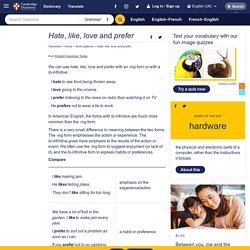
I love going to the cinema. I prefer listening to the news on radio than watching it on TV. He prefers not to wear a tie to work. Verbs Followed by Gerunds OR Infinitives (Different Usage) TO-infinitive or gerund: LIKE, HATE, PREFER, CAN'T BEAR. The verbs like and hate express (dis)liking if they are followed by a gerund: I like getting up early in summer.
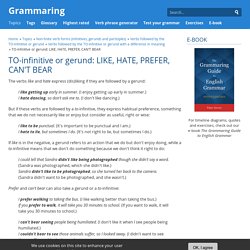
(I enjoy getting up early in summer.) Gerund and infinitive after verbs - different meaning. VERB PATTERNS. INFINITIVE VS. GERUND VERB PATTERNS ppt video online download. Key Words for the English Tenses - English ESL Powerpoints for distance learning and physical classrooms. ASK QUESTIONS FOR THE UNDERLINED WORDS - ESL worksheet by duyge.
Questions worksheets: basic questions Level: elementary Age: 12-17 Downloads: 1750 A CLOSE ENCOUNTER Level: elementary Age: 9-14 Downloads: 1155 Questions (3) Level: elementary Age: 14-17 Downloads: 865.
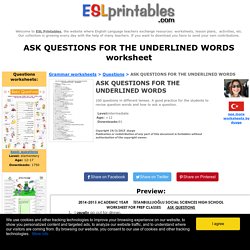
Ask for the underlined words - QN2 - English Grammar. Ask Questions. ASK FOR THE UNDERLINED WORD - Clothes & Food, Present Simple - ESL worksheet by barabulka. Simple present worksheets: Present Simple/English test/ 3 pages Level: elementary Age: 10-14 Downloads: 10099 Present simple Level: elementary Age: 10-17 Downloads: 9495.
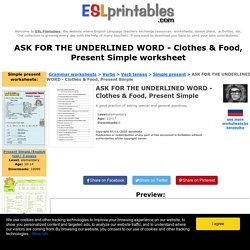
Ask for the underlined words - QN2 - English Grammar. Possessives in English. The Saxon Genitive is used with the nouns for people, animals, countries, expressions of time, as well as the collective names for people and animals.

It establishes a relationship of ownership or possession between two terms. The Saxon genitive is formed by adding an apostrophe and an “s” to the name of the owner. Examples. Clase de inglés con ejemplos y test final □ English Possessive's: When to Use The Saxon Genitive - Wall Street English. The Saxon Genitive is one of the main forms we use to express possession in English.

It’s something that many people have heard of but perhaps find it a little difficult to put into practice. Let’s look at what it is and how to use it. Grammar - Intermediate to upper intermediate. Look at these examples to see how as and like are used.

I worked as an actor for two years. I went home early as I felt ill. He looks as if he hasn't slept. As you know, this is the third time I've had to complain. He looks like his dad. All vs Whole. 1. The word order is different: All + the + noun The + whole + noun. All or whole ? All and whole are determiners. We use them before nouns and with other determiners to refer to a total number or complete set of things in a group. Compare All my family lives abroad. or My whole family lives abroad. We often use all and the whole with of the: She complains all of the time. or She complains the whole of the time. Using all and whole ~ English grammar. All and whole are quantifiers, and as such they are a form of determiner.
They express totality or completeness. Sometimes one can choose either of them; but there are major differences in their usage, and all and whole are not always interchangeable All can refer to singular nouns or pronouns, or to plural nouns or pronouns.Wholeis essentially used with nouns in the singular. It is occasionally used as a descriptive adjective with nouns in the plural, and cannot normally be used with pronouns..
All All implies a complete number or total entity. Reported Speech Quiz for English Learners. La diferencia entre WILL & GOING TO en inglés.